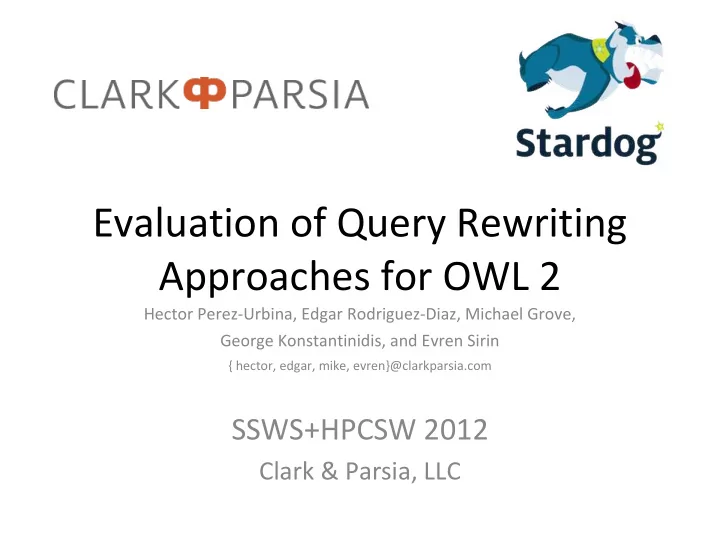

Evaluation of Query Rewriting Approaches for OWL 2 Hector Perez-Urbina, Edgar Rodriguez-Diaz, Michael Grove, George Konstantinidis, and Evren Sirin { hector, edgar, mike, evren}@clarkparsia.com SSWS+HPCSW 2012 Clark & Parsia, LLC
○ Semantic Research & Development firm since 2005 ○ Washington, DC ○ Cambridge, MA ○ Leading supplier of innovative semantic technologies ○ Semantic Web ○ Web Services ○ Advanced AI technologies ○ Committed to development and adoption of standards ○ Participated in several W3C working groups ○ Organized OWLED workshops to foster relationships between researchers and industry
Query Rewriting TBox Conjunctive Query Query Rewriting Algorithm Rewritings
Why? ○ Independent of ABox in terms of size and computation time ○ No need to update the rewritings every time the ABox changes ○ Evaluation of rewritings can be delegated ○ The same rewritings can be evaluated over different instances of data without having to be recomputed
Not a Silver Bullet ○ Rewritings might get too big/complex to evaluate efficiently ( EXP even for QL) ○ Rewritings might need to be recursive or disjunctive DQs (1) for more expressive fragments of OWL ○ Expressive ontologies might generate rewritings that are more difficult to evaluate (1) Datalog Queries
State of the Art
Comparison
Evaluation Questions ○ Can UCQs (1) be evaluated more efficiently (faster) than DQs? ○ Can Requiem be made faster by enhancing it with various optimizations (like some of the approaches in other algorithms)? (1) Union of Conjunctive Queries
Blackout ○ Stardog component ○ Highly optimized version of Requiem ○ Eager query containment ○ Data oracle
Empirical Evaluation ○ Empirical evaluation of Blackout (Stardog 1.0.3) and Clipper ○ Support the most expressive logics ○ Two different approaches (UCQs vs DQ) ○ Using LUBM benchmark ○ 14 queries ○ 3 different TBoxes (for QL, EL, and RL) ○ 4 different ABoxes of increasing size ○ Very simple hardware ○ 8 GB RAM ○ AMD 3.2 Ghz - 4 cores ○ First, examine performance of the rewritings computation (size/complexity, time) ○ Second, examine how fast the rewritings can be evaluated using two database systems (DLV, Stardog)
Rewriting Computation Results
Rewriting Evaluation Results
Overall Blackout/Stardog Performance
Conclusions ○ DQ-producing approaches do not necessarily produce smaller rewritings than UCQ-producing approaches ○ Some optimizations, such as the data oracle, should apply to DQs as well ○ It is not necessary to produce DQs for RL and EL in many cases ○ UCQs are amenable to straightforward parallel evaluation ○ Evaluating the rewritings dominates the overall query answering time at large scales ○ It is worth investing time on optimizing the computation of rewritings that can be evaluated more efficiently
Future Work ○ Add datalog evaluation to Stardog based on Query-SubQuery algorithm ○ Parallelization of UCQ evaluation within Stardog ○ Explore the performance implications of new SPARQL 1.1 features (sub-queries, transitivity, property paths) in rewritings ○ Determine if Blackout can be used to handle queries utilizing these SPARQL 1.1 features
Questions?
Recommend
More recommend